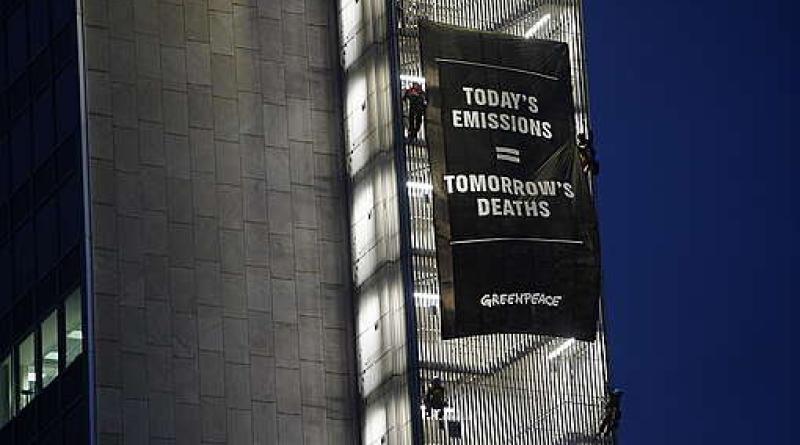‘Getting away with murder?’: European Oil and Gas majors’ 2022 emissions alone could cause at least 360,000 temperature-related premature deaths before 2100

Dubai – An estimated 360,000 people could die prematurely before the end of the century because of global heating caused by the 2022 greenhouse gas emissions of nine major European oil and gas companies alone, according to a Greenpeace Netherlands study.[1]
Released today at COP28, the study analyses the self-reported 2022 greenhouse gas emissions of nine major European oil and gas companies: Shell, TotalEnergies, BP, Equinor, Eni, Repsol, OMV, Orlen, and Wintershall Dea. Using the Mortality Cost of Carbon method developed by US researcher R. Daniel Bressler, it estimates that these companies could collectively cause an estimated 360,000 temperature-related premature deaths before the end of the century with their emissions of 2.7 billion metric tons of CO2 from 2022 alone.[2]
Lisa Göldner from Greenpeace’s Fossil Free Revolution campaign, said: “Are fossil fuel companies getting away with murder? Just one year of emissions will create deadly ripples until the end of the century. So, if the fossil fuel industry continues extracting and burning fossil fuels at today’s scale, millions of people all over the world could die prematurely. Phasing out fossil fuels is a matter of life and death, so governments need to act now to ban new fossil fuel projects and force fossil fuel companies to rapidly cut their emissions.”[3]
According to the report, the estimates are likely extremely conservative for five reasons: they only consider excess deaths caused directly by extreme temperatures and don’t assess other climate impacts like more frequent and more extreme flooding, drought, wildfires or storms or infectious disease; they don’t take into account deaths caused by air pollution resulting from burning fossil fuels, or other hazards that result from the production and use of fossil fuels; the companies’ self-reported carbon emissions could be lower than estimates applying other carbon accounting approaches; the study uses a conservative future greenhouse gas emissions scenario; and this estimate only looks at the year 2022, meaning these excess deaths will multiply year by year if fossil fuel emissions are not drastically cut. For these reasons, the true number of premature deaths attributable to the greenhouse gas emissions of the nine oil and gas companies could be larger.
The study, called ‘Today’s emissions, tomorrow’s deaths: How Europe’s major oil and gas companies are putting lives at risk’, is being discussed at a COP28 press conference today (Tuesday 5 December).[4]
Panellist and climate justice activist Vanessa Nakate said: “Fossil fuels are key to environmental destruction, especially for people in the global south. It’s no secret that burning more oil and gas worsens climate breakdown – and right now, they are already harming people’s lives in Uganda, where I’m from, in communities across Africa, and all over the world. This is a matter of climate justice. We need wealthier countries that are most responsible for the climate crisis to stop new fossil fuel projects, invest in clean energy – and help global south nations to do the same.”
Greenpeace is calling on world leaders at COP28 to agree to a swift and fair phase-out of coal, oil and gas, ban all new fossil fuel extraction, and to increase taxes on fossil fuel companies to pay for climate finance and loss and damage, with developed countries who have historic responsibility for emissions leading the way. In 2022, these nine companies reportedly made enormous profits of a combined $163.07 billion. Meanwhile, developing countries are facing climate loss and damage costs of around $400bn by 2030.[5][6]
Independent legal experts in Europe consulted by Greenpeace Netherlands have said that there could be legal basis to prosecute fossil fuel companies for endangering both human life and the environment under their respective national criminal laws, but that the criminal justice systems have been historically under-used for this purpose.[7] Greenpeace Netherlands is calling for laws to be further tested through strategic litigation as a way to address the existential threat of the climate crisis and advocate for impacted communities.





